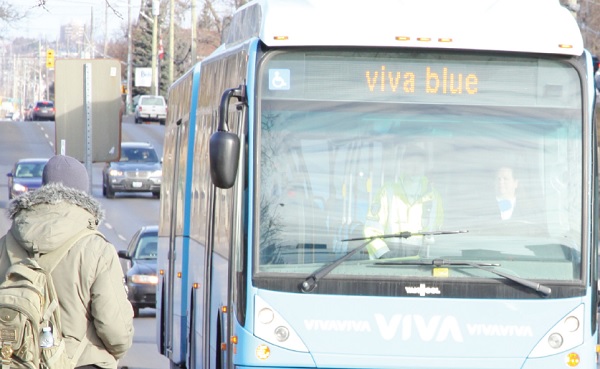Archive
Transit fare hike approved with break for kids and seniors
October 2, 2013 · 0 Comments

By Brock Weir
York Regional Council approved transit fare hikes for the year ahead, but offered a degree of relief for kids and seniors on the final vote Thursday.
Following last week’s vote, standard cash fares on York Region Transit will increase by 25 cents to $4, express fares will increase to $4.50, adult tickets to $3.30, student tickets to $2.50, senior and child tickets to $2, and express tickets to $3.80.
Adult and student monthly passes will also see an increase. Adults riding the YRT will see their monthly passes rise to $132 ($152 for an express pass), and students to $99. During last week’s debate, however, users of seniors and children passes got a slight break, as Regional Council voted to nix fare increases on those passes.
The suggestion was made by Vaughan Councillor Deb Schulte who said the purchases of senior and child passes had been trending downward, and increasing fares would only exacerbate the problem.
“This is really a demographic we would like to move onto the pass, and the more we raise those amounts the less chance we have of getting people to go in that direction,” she said. “We’re not talking about a lot of a [cost] impact [if we take this off]. It is $50,000 and I think it makes a big difference if we’re trying to move people to get passes and go in that direction.”
While her motion to keep the status quo on senior and child passes received the overall support of Regional Council, it highlighted what Council described as the difficulty in striking the right balance between the Region’s stated objective of hitting 50 per cent cost recovery from transit through fares, while keeping fares themselves competitive to get more people on buses.
“We have to come to terms with what direction we want to take,” said Vaughan Regional Councillor Gino Rosati. “Do we want the taxpayers to pay more, or the rider? Somebody has to pay. We can’t aim for 50 per cent but then say we don’t want any unreasonable increase.”
He suggested making a further recommendation to Regional Council in October for staff to revisit the 50-50 goal. A better solution, he ventured, might be a new plan to keep that 50-50 on the books, but with a plan to increase fares 1 per cent each year until it is achieved within a 10 year window.
“[That way] it doesn’t have to come to this Council,” he concluded. “It gets politically charged every year. We get complaints every year from our riders and then we have to try and explain as to why, and they don’t want to hear the why.”
Reconsidering the 50-50 split, and how to get there, was something also supported by Richmond Hill Regional Councillor Vito Spatafora, noting the split before them would really be in the range of 42-58.
“We should be looking at what split we should be considering because this is going to go on for some time,” he said. “[Child and senior passes aren’t] a big hit, but I do believe the general principle that we have to reach a target that is equitable and reasonable both for the transit user and the taxpayer.”
Next year’s increase will be four times the projected inflation rate and 7.9 per cent above current fares, argued Markham Regional Councillor Jack Heath. The Region, he said, should consider other ways to bring money from the Region rather than to put the charges on people who most depend on transit.
“If you wanted to say we should have an increase in the cash fares, that would be a good idea, but all the rest we have to find ways to ensure that the needs of York Region Transit are covered elsewhere in the budget, but not through the cash box,” he said. “When we say we want to take cars off the road and we want to have more people taking transit, we should have some kind of enticement to ensure that fare is the responsible fair, and the right kind of fare so people would say, ‘Hey, it would be cheaper to take transit and not a car’.
“I challenge you to find a way to prove that transit is cheaper than a car, especially if you have someone who lives in the south end of the Region…who wants to go into Toronto via transit. The cost is exceptionally high. I don’t think we should be doing that to the people who want to take transit, and need to take transit to go to a job.”
With adult monthly passes clocking in at under $1,600 a year, Newmarket Regional Councillor John Taylor argued that was indeed cheaper than a car.
Councillor Schulte’s further motion to nix the increase on student passes, a move which would have had a $300,000 cost impact, was voted down.
Following Regional Council, Mayor Geoffrey Dawe said he previously supported the suggestion to keep the cost of child and senior passes as they are.
“[Councillor Schulte] is bringing up a serious socio-economical issue in that some people are obviously greatly affected by an increase in transit fares and we need to keep that first and foremost in their minds,” he said.
It’s time now to step back from the Regional Council’s objective to get to that 50-50 level to review whether they are on the right track or if there are different approaches to take.
“If that is what we’re trying to achieve, we have to stick to our guns,” he said, noting he agreed with the suggestion to set a 1 per cent per year target in a 10 year window to close the gap. “It’s a much easier pill to swallow that way.”











